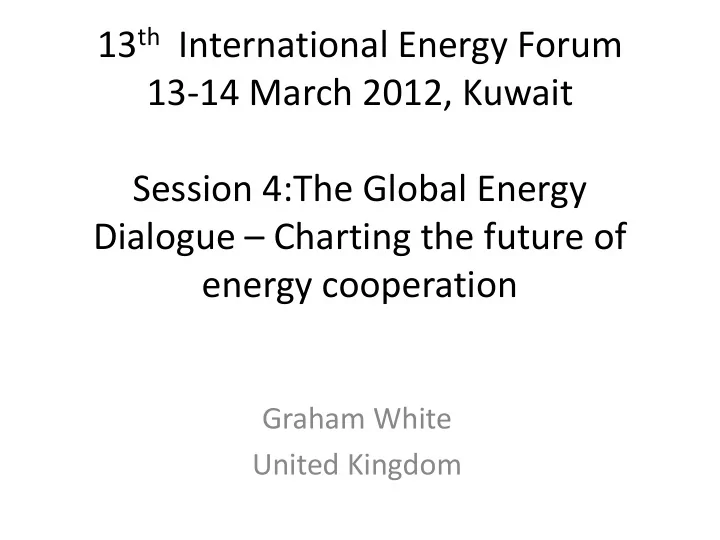

13 th International Energy Forum 13-14 March 2012, Kuwait Session 4:The Global Energy Dialogue – Charting the future of energy cooperation Graham White United Kingdom
The Global Situation • The world is an uncertain place, going through difficult economic times • Unprecedented global energy events have had an impact on energy markets – e.g. Macondo accident, Arab Spring, Fukushima, and Iran • Economic situation has restrained demand and investment • BUT this will not last, demand for energy will come back and will supply be ready?
Global Energy Themes • Maintaining Energy Security – improving the transparency of markets, understanding future demand and supply better and reducing price volatility • Mitigating Climate Change – accelerating energy efficiency and promoting clean technologies such as renewables and carbon, capture and storage • Increasing Access to Electricity – mapping the challenge, identifying solutions and spreading the availability of technologies
Many Challenges • Oil will remain central to our energy world and price will continue to be a political issue • Gas will increase its role, and be important for energy security and climate mitigation • Coal will remain crucial for many countries but its emissions need to be tackled through CCS • Energy efficiency has huge potential but this is not being realised • The expansion of nuclear power has been slowed and remains controversial in some countries • Renewables is expanding quickly but from a low base and with concerns about costs
The Role of the IEF • These challenges require global debate and international collaboration • The IEF is in a unique position, with its wide membership, to facilitate that discussion • It has a new enhanced Charter, informed by an Expert Group, discussed and agreed by its 88 Members • It established a concrete work programme with the IEA and OPEC – improving the transparency of oil data (JODI), understanding the interactions between physical and financial markets and sharing views on energy outlooks, both in the near and long term
A Successful Phase 1 – Now Phase 2 Oil should remain a priority • Continue the work on: (a) price formation and the role of financial markets; (b) comparisons of different views on energy outlooks; and (c) the work of JODI • Focus on upstream and downstream investments (creating a new high quality database) • And focus on demand (particularly medium/long term trends) where a continuing need for oil is inevitable
Other Possible Priorities for Phase 2 1. Deepening our understanding of future energy demand trends , particularly in new emerging markets 2. Deepening our understanding of the constraints on energy investment and whether supply will be able to meet future demand 3. In depth regional focus – Asia, Africa and South America 4. A greater emphasis on the increasing importance of gas 5. Assessing the implications of changing global trends on international energy policies and governance
Setting the agenda for Phase 2 • Set out a four year strategic plan around the priority subjects Ministers want to discuss, with a more detailed two year work programme • A constructive dialogue will be enhanced by a high quality data and analytical framework • The plan should be developed through a wide- ranging consultation process • Need to explore finance availability from a range of different sources
Co-operation is essential • There are many international organisations, but the IEF has the widest membership and can facilitate enhanced cooperation • To establish a global strategic plan the IEF, IEA and OPEC need to collaborate closely, bringing in others as necessary • A well co-ordinated work programme, to develop the analytical framework, will also be a valuable resource which the G8, G20 or wider bodies with an interest in energy can use • Industry should participate strongly and be more integrated into the process • A research network of institutions could be established to support the analytical work
Summary • The new Charter has started well with a successful first phase • Remaining informal but tackling topical, and difficult, issues through a collaborative approach • But it is only the start - the IEF can be more ambitious , with a new strategic plan and programme of work reflecting your priorities • Dialogue will be enhanced through a good quality data and analytical framework • This needs to be built around strong cooperation with member countries, industry and research institutions • BUT IT NEEDS YOUR INPUT TO SET YOUR PRIORITIES
Recommend
More recommend